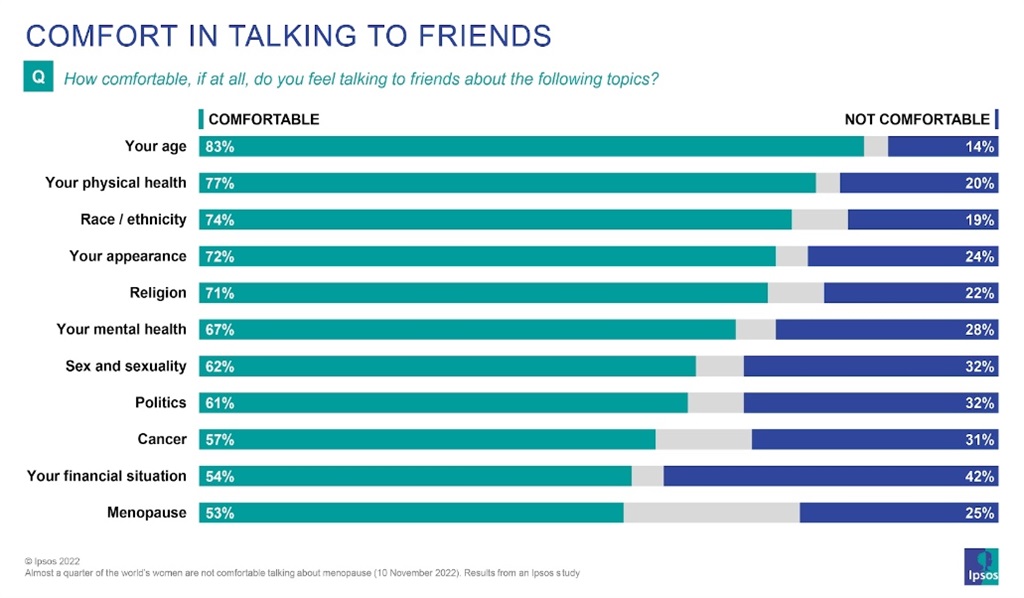- Menopause is something that all women will potentially experience, yet it is still something of a taboo to many.
- New research by Ipsos across 33 countries looks at the attitudes towards menopause by both women and men.
- The results show that in many countries, people would prefer talking about several other topics than menopause.
- This must change, as menopause is not just a woman's issue.
Hot flashes, night sweats, mood changes: for half the world's population, menopause - which marks the end of a woman's menstrual cycle - is inescapable, so it's important that every woman understands and honours this natural biological process. Yet, nearly a quarter of the world's women are uncomfortable talking about it. This is according to a recent 33-country survey by market research company Ipsos, which includes responses from 23 000 adults. More than 50% of men surveyed said they were even less comfortable with this topic.
Leading the menopause discussions were Great Britain (65%), India (65%) and South Africa (63%). On the other end, countries that felt the least comfortable talking to friends about menopause were Hungary (22%), South Korea (39%), and Malaysia (40%).
READ MORE | A doctor's guide to healthy living at every stage of womanhood - from pre-puberty to menopause
When the researchers compared the 11 other topics of conversations measured, they found menopause to be the least comfortable topic globally (among those listed): people were slightly more comfortable discussing their own financial situation, cancer and politics.
In South Africa, however, finances are the least talked about topic (49%), followed by menopause (63%) and mental health (69%).
Breaking it down even further, the survey shows that in South Africa, women are more comfortable talking to their friends about menopause than men. Asking South Africans which topics they feel more comfortable with, generally speaking, age (89%), race/ethnicity (87%) and religion (87%) trumps.
Interestingly, men in South Africa reportedly share a higher knowledge base on menopause than the global country average.
'Only 66% of women are knowledgeable about menopause'
With menopausal impact on the lives of many, the authors of the report say that it is startling that only just over half of people around the world say they are knowledgeable about menopause. They add:
Importantly, the global population of postmenopausal women is growing: in 2011, women aged 50 and older accounted for 22% of all females globally. In 2021, this increased to 26%. And, looking at South Africa, a similar trend can be seen with a three-percentage point increase from 18% to 21%. Women are also living longer globally, data indicates.
READ MORE | These 5 essential health checks are non-negotiable, ladies – here’s where to go and how much they cost
In a 2020 article for the Guardian, Diane Danzebrink wrote ignorance about menopause was "destroying lives" and that it wasn't simply women who suffered. "Menopause is not just a women's issue. It can affect us all: women suffer in silence, relationships break down, and careers are lost. Far too many are paying the needless price for a woeful lack of menopause education, care and support," she wrote.
Since menopause can offer an important opportunity to reassess health and lifestyle, and with symptoms such as tiredness, hot flushes, lacking energy, headaches, difficulty in concentrating, irritability, difficulty sleeping/insomnia, muscle/joint pains, changes in mood and so forth, both women and men need to be better equipped to support women around menopause, the researchers behind the Ipsos survey say.
Out of 13 of the 33 countries surveyed, nearly half of respondents said that they are very or fairly knowledgeable about menopause. "[This] indicates that governments and healthcare facilities have a long way to go in raising awareness of menopause and its impact on women at individual and societal levels," write the authors.
Michelle Obama on her menopause experience
This month, former US First Lady Michelle Obama opened up about her experiences with menopause in The Michelle Obama Podcast, saying that she had hormone replacement therapy to help with the hot flashes she experienced.
Hormone replacement therapy is medication that contains female hormones and is used to treat symptoms of menopause. Hormone therapy is most often used to treat common menopausal symptoms, including hot flashes and vaginal discomfort, explains the Cleveland Clinic. There are many health benefits and risks associated with taking this type of therapy, so if you're interested, it's best to discuss it with your healthcare provider.
READ MORE | It’s time to normalise conversations about menopause in the workplace
Obama hoped that by sharing her experiences about menopause and hormone replacement therapy, she could spread awareness and encourage more people to talk about menopause.
"There is not a lot of conversation about menopause. I'm going through it, and I know all of my friends are going through it. And the information is sparse," Obama told PEOPLE.




 Publications
Publications
 Partners
Partners












